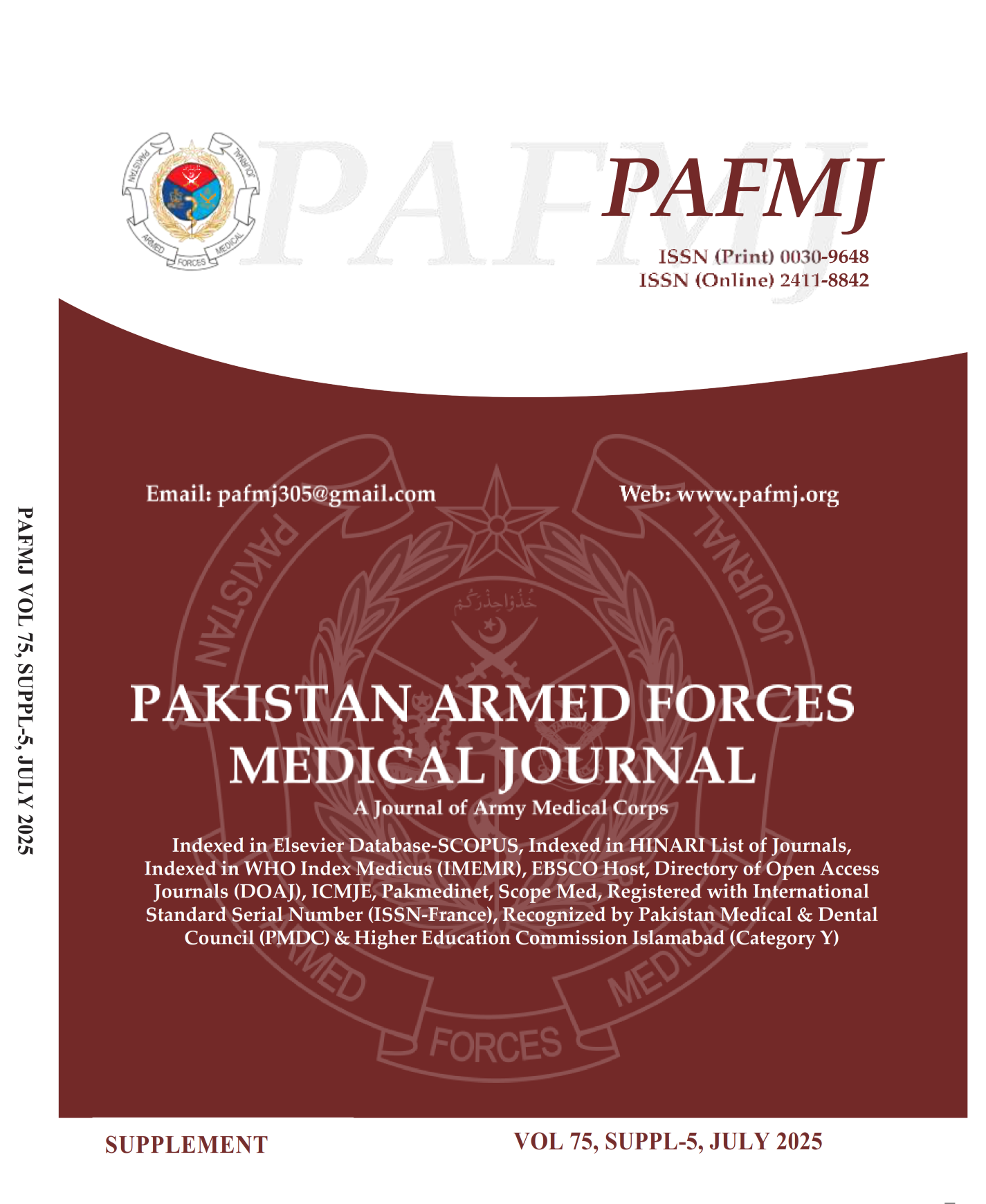Apixaban vs Warfarin: Safety In Patients with Advanced Kidney Disease
DOI:
https://doi.org/10.51253/pafmj.v75iSUPPL-5.9004Keywords:
Apixaban; Chronic kidney disease; Safety; WarfarinAbstract
Objective: To compare the safety of Apixaban and Warfarin in patients suffering from advanced chronic kidney disease
Study Design: Comparative Cross-sectional study
Place and Duration of Study: Department of Medicine and Nephrology Pak Emirates Military Hospital Rawalpindi, Pakistan from Aug 2021 to Jul 2022.
Methodology: A total of 135 cases of advanced chronic kidney disease (stage IV and V) requiring anticoagulation for deep venous thrombosis or atrial fibrillation were recruited in the study. They were randomly divided into two groups. Patients in group I received Apixaban while patients in group II received Warfarin for anticoagulation. They were followed up for three months to look for safety. Major bleeding, Fatal bleeding, non-fatal major bleeding at a critical site and other non-fatal bleedings were compared in both the groups for three months of treatment with the assigned medication.
Results: Out of 135 patients of advanced chronic kidney disease managed for atrial fibrillation or deep venous thrombosis, 70(55.6%) patients were males and 55(44.4%) were females. 66(48.9%) took Apixaban while 69(51.1%) took Warfarin for anticoagulation. Bleeding related adverse effects like major bleeding, fatal bleeding, non-fatal major bleeding at a critical site and other non-fatal bleedings were not statistically significant in both the groups (p-value>0.05).
Conclusion: Both medications were relatively safe and rate of different types of bleeding was quite low in both the groups. Both medications turned out to be not very different in terms of safety profile in patients suffering from advanced chronic kidney disease.
Downloads
References
1. Fraser SD, Blakeman T. Chronic kidney disease: identification and management in primary care. Pragmat Obs Res. 2016; 7: 21–32. Published 2016 Aug 17.
https://doi:10.2147/POR.S97310
2. O'Callaghan-Gordo C, Shivashankar R, Anand S, et al. Prevalence of and risk factors for chronic kidney disease of unknown aetiology in India: secondary data analysis of three population-based cross-sectional studies [published correction appears in BMJ Open. 2019 Mar 18;9(3):e023353corr1].BMJ Open. 2019; 9(3): e023353. Published 2019.
https://doi:10.1136/bmjopen-2018-023353
3. Ruwanpathirana T, Senanayake S, Gunawardana N, et al. Prevalence and risk factors for impaired kidney function in the district of Anuradhapura, Sri Lanka: a cross-sectional population-representative survey in those at risk of chronic kidney disease of unknown aetiology.BMC Public Health. 2019; 19(1): 763. Published 2019.
https://doi:10.1186/s12889-019-7117-2
4. Grill AK, Brimble S. Approach to the detection and management of chronic kidney disease: What primary care providers need to know.Can Fam Physician. 2018; 64(10): 728–735.
5. Aoun M, Karam R, Sleilaty G, Antoun L, Ammar W. Iron deficiency across chronic kidney disease stages: Is there a reverse gender pattern? Barretti P, ed.PLoS ONE. 2018; 13(1): e0191541.
https://doi:10.1371/journal.pone.0191541.
6. Aursulesei V, Costache II. Anticoagulation in chronic kidney disease: from guidelines to clinical practice. Clin Cardiol. 2019; 42(8): 774-782.
https://doi:10.1002/clc.23196
7. Iseri K, Dai L, Chen Z, et al. Bone mineral density and mortality in end-stage renal disease patients. Clin Kidney J. 2020; 13(3): 307-321. Published 2020.
https://doi:10.1093/ckj/sfaa089
8. Chokesuwattanaskul R, Thongprayoon C, Tanawuttiwat T, Kaewput W, Pachariyanon P, Cheungpasitporn W. Safety and efficacy of apixaban versus warfarin in patients with end-stage renal disease: Meta-analysis [published correction appears in Pacing Clin Electrophysiol. 2018 Jul;41(7):879]. Pacing Clin Electrophysiol. 2018; 41(6): 627-634.
https://doi:10.1111/pace.13331
9. Hanni C, Petrovitch E, Ali M, et al. Outcomes associated with apixaban vs warfarin in patients with renal dysfunction. Blood Adv. 2020; 4(11): 2366-2371.
https://doi:10.1182/bloodadvances.2019000972
10. Stanifer JW, Pokorney SD, Chertow GM, et al. Apixaban Versus Warfarin in Patients With Atrial Fibrillation and Advanced Chronic Kidney Disease. Circulation. 2020; 141(17): 1384-1392. https://doi:10.1161/CIRCULATIONAHA.119.044059
11. Tahir S, Iqbal N, Tahir MB, Sultan I, Shafi S, Shahid O. Frequency of Major Bleeding Episodes with Rivaroxaban for Atrial Fibrillation Related Stroke Prevention in Chronic Kidney Disease Patients. Pak Heart J. 2022; 55(01): 63-67
12. Schafer JH, Casey AL, Dupre KA, Staubes BA. Safety and Efficacy of Apixaban Versus Warfarin in Patients With Advanced Chronic Kidney Disease. Ann Pharmacother. 2018; 52(11): 1078-1084. https://doi:10.1177/1060028018781853
13. Chen TK, Knicely DH, Grams ME. Chronic Kidney Disease Diagnosis and Management: A Review. JAMA. 2019; 322(13): 1294-1304. https://doi:10.1001/jama.2019.14745
14. Brophy DF. Apixaban Dosing in Chronic Kidney Disease: Differences Between U.S. and E.U. Labeling. J Am Coll Cardiol. 2017; 69(9): 1211. https://doi:10.1016/j.jacc.2016.11.074
15. Jain N, Reilly RF. Clinical Pharmacology of Oral Anticoagulants in Patients with Kidney Disease [published correction appears in Clin J Am Soc Nephrol. 2019; 14(5): 750]. Clin J Am Soc Nephrol. 2019; 14(2): 278-287.
https://doi:10.2215/CJN.02170218
16. Fu CM, Li LC, Lee YT, Wang SW, Hsu CN. Apixaban vs. Warfarin in Atrial Fibrillation Patients With Chronic Kidney Disease. Front Cardiovasc Med. 2021;8(3):752468. Published 2021. https://doi:10.3389/fcvm.2021.752468
17. Herndon K, Guidry TJ, Wassell K, Elliott W. Characterizing the Safety Profile of Apixaban Versus Warfarin in Moderate to Severe Chronic Kidney Disease at a Veterans Affairs Hospital. Ann Pharmacother. 2020; 54(6): 554-560.
https://doi:10.1177/1060028019897053
18. Starr JA, Pinner NA, Mannis M, Stuart MK. A Review of Direct Oral Anticoagulants in Patients With Stage 5 or End-Stage Kidney Disease. Ann Pharmacother. 2022; 56(6): 691-703. https://doi:10.1177/10600280211040093
19. Cohen AT, Sah J, Dhamane AD, et al. Effectiveness and Safety of Apixaban versus Warfarin in Venous Thromboembolism Patients with Chronic Kidney Disease [published online ahead of print, 2021 Dec 28]. Thromb Haemost. 2021; 10(1): 10-14s.1055/s-0041-1740254.
https://doi:10.1055/s-0041-17402
Downloads
Published
Issue
Section
License
Copyright (c) 2025 Ahsan Tanveer, Khalid Mehmood, Mehmood Hussain, Farhan Zaid, Soban Ahmed Tariq, Aakash Aslam

This work is licensed under a Creative Commons Attribution-NonCommercial 4.0 International License.















